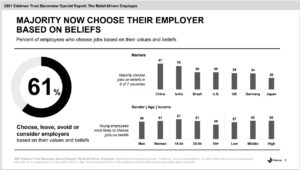The 5 human-centered skills that have a big impact on workforce health and operations
Focusing on core elements of human interaction, and not on business processes, can help improve those same processes.

2020 and the first part of 2021 will go down as among the most challenging years ever for business. From wildly fluctuating customer demand to pressures to slash budgets, the trials just keep coming.
The summer can offer downtime for organizations to step back and reboot their work. For example, many higher-education institutions use the summer to plan for the fall semester and try to figure out how to come back from the upheaval. In order to recover from these difficult times, businesses should focus not only on ways to regain lost revenue, but also revive five basic, human-centered skills that are sometimes taken for granted.
Skill 1: Empathy
The ability to sense other people’s emotions and imagine what someone else might be thinking or feeling has never been more important, especially in the workplace. Whether your employees are returning to work after a year at home or have been working in the office throughout the pandemic, they all are experiencing intense emotions that can interfere with productivity.
Because true empathy comes naturally to only some people, it’s vital that the skill be inculcated throughout an entire organization, which requires discipline and support. The payoff, however, is immense because empathy:
- Has been directly tied to business success. In the 2021 State of Workplace Empathy Report, 84% of CEOs reported that empathy drives better business outcomes. It also helps to engage, attract and retain the best talent.
- Breaks down communications barriers. When people actively try to understand what someone is saying, as well as the emotional context of the speaker’s words, communication improves.
- Can smooth over technological rough spots. The explosion of virtual education and the remote workforce make it difficult to pick up on nonverbal communication. Empathy can be a bridge that spans the gap. People tend to be more forgiving of the foibles that come with remote connection when they are empathetic.
Skill 2: Agility
An agile mindset empowers individuals, departments and entire institutions to operate with a focus on adaptation, which can reduce stress brought on by change.
Developing an agile mindset is easiest with the right tools. For example, employee self-scheduling—a growing management tool in healthcare and hospitality—enables those who manage hourly or shift workers to easily and quickly plan for changes in workloads while empowering workers to gain more control over their schedules.
In a self-scheduling model, a manager plans what shifts need to be filled and the requirements necessary to make those shifts work, like overtime caps or required certifications. Employees can then claim the hours they want rather than having a manager assign them. When they need to swap a shift with a coworker, they can easily do so within the shift structure. This management approach enhances agility by:
- Freeing up the scheduling manager’s time.
- Providing a top-level view of work that needs to be done instead of getting lost in the weeds when managers are required to hammer out every detail of every shift.
- Giving employees a voice and a way to better manage their lives.
Skill 3: Resiliency
Also known as mental toughness or grit, resilience must be cultivated and practiced with intention. When modeled by leadership, resiliency can spread throughout departments and entire institutions. When it becomes part of organizational culture, resilience:
- Enables people to view change as a growth opportunity instead of a threat.
- Encourages people to understand that not everything is within their control, allowing them to focus on what they can control.
- Can help spread optimism during challenging times.
Developing resilience within an organization requires not only empathy and agility, but also a positive mindset and management systems that foster flexibility.
Skill 4: Simplicity
The more uncertain the future, the simpler the path forward must be. Tools, systems and policies that involve complicated procedures or moving parts get in the way when unpredictability runs rampant. Move toward simplicity by:
- Paring things down to their most basic elements. When times are static, it’s easy to add bloat to how work is performed. In times of change or crisis, however, an institution’s survival can depend on getting the essentials accomplished quickly and thoroughly before moving on to anything else.
- Finding paths of least resistance. What tasks, tools or procedures will be easiest for a diverse staff to perform, learn or understand?
- Balancing necessary policies. Some policies, of course, are required by law or institutional rules. However, it’s possible to make some changes and achieve the same intended result. For example, implementing a bring-your-own device policy could solve the problem of having to purchase and maintain tech equipment for your staff.
Skill 5: Creativity
Creativity is born of simplicity. When unnecessary complexity is removed from operations, creativity:
- Becomes habit. As staff exercises creative problem-solving skills, they will come up with solutions faster and more frequently.
- Helps people embrace change instead of fearing it.
- Empowers employees and managers to identify longer-term solutions and strategies that enable growth, rather than relying on short-term survival tactics.
Change has always been with us, and so many industries have proven their adaptability and ability to survive during the past year. By turning to basic human-centered skills that have a direct impact on operations, leaders can fuel an engine of not only survival, but growth in the year ahead.
Chad Halvorson is the founder and chief experience officer of When I Work, a market leader in workforce management for shift-based workplaces that provides a fully integrated scheduling, time tracking, and team messaging solution to nearly 200,000 workplaces.






